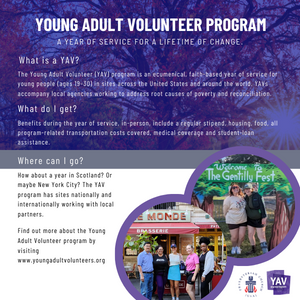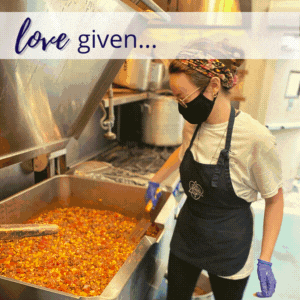
Frequently Asked Questions About Faith-Based Service
If you have lots of questions about whether or not you are able to serve – rest assured that you are not alone. Here are some of the questions we receive most frequently. If you have questions that are not answered here, send us a message and we will follow up with you individually.
The Basics
Catholic Volunteer Network member programs have positions available in nearly all fifty states, the District of Columbia, and two overseas U.S. territories (Puerto Rico and American Samoa). Additionally, there are currently positions in over 100 countries across the world including placements in Africa, Asia, Central America and the Caribbean, South America, Europe, North America, Australia, and the South Pacific. There are positions in every type of setting: large and small cities, suburbs, and rural areas. If you feel drawn to serve in a particular location – you can search through our RESPONSE directory to locate opportunities by state, region, or country.
That depends on you. Our member programs offer opportunities that range from a week to a three and half year commitment. There are programs available for high school and college students during the summer break as well. If you have a specific amount of time available, utilize our RESPONSE search feature to sort through the programs offering a time frame that works for your schedule.
Yes – there are opportunities for families to serve together, however programs vary in their capacity to accept married volunteers and/or volunteers with dependents. Use our RESPONSE directory of opportunities to identify programs that allow you to serve with your spouse and/or children.
Programs are highly skilled at matching applicants with placements that best suit their skills and interests. It’s likely that the volunteer program will work with you to determine the best fit. If you have particular geographic or placement preferences, please be sure to let the programs know in your application.
It depends on the program. Short-term programs (e.g., week-long spring breaks or three month summer programs) offer opportunities for high school aged youth and students still in college. Most long-term programs require participants to be at least 21, but some do accept applicants as young as 18. Most programs have no upper age limit. In fact, some programs are specifically designed for older or retired applicants. Be sure to check out individual programs for more information.
Different programs offer volunteers different living arrangements. The most common arrangement is for programs to offer housing for volunteers to live together in community, usually in close proximity to the community that you are serving. Other volunteers live with religious sisters or brothers or priests while some live with families. In rare instances, a volunteer may live alone. You can search programs on this web site by the type of living arrangement they offer.
Nearly 100 programs currently accept volunteers without degrees. Requirements vary from program to program so be sure to contact the program in which you are interested.
No, you do not have to be a U.S. citizen to serve in many of our programs. Many programs are able to accommodate foreign applicants who are able to secure their own visa, and some are even able to provide assistance in the process of getting a visa to serve in the U.S. Use our RESPONSE directory of opportunities to determine which programs accept persons who are not American citizens.
Volunteer Placements
Almost anything you can think of. Placements include positions in social service, medicine and nursing, immigration, legal aid, homeless services, prison ministry, bookkeeping, community organizing, child care, agriculture, construction and housing rehabilitation, teaching, religious education, social justice ministry, and more. Many programs offer the opportunity for volunteers to put their professional skills to good use, or give volunteers the chance to try out something brand new.
Again, that depends on the program and the placement. Certain positions require someone who already has a specific job skill, but most positions are open to anyone with a willingness to learn. Opportunities in fields as varied as education, health care, and social service are available to those with no previous training or experience. A volunteer placement can be an excellent way to gain experience in a field and to develop your professional skills. Skills training is often provided as part of the program.
Finances
Most of our long-term programs do not charge any placement fees to their volunteers. Short-term or weeklong programs may request a small amount to cover food and housing.
Volunteering is a commitment on many levels–spiritually, emotionally, professionally, and of course, financially. Volunteering by its very nature is not going to make you rich—at least financially speaking. Catholic Volunteer Network requires that all programs provide for their volunteers basic needs during their service term. Most programs provide basic room and board and a modest living stipend, usually paid monthly. Volunteers are asked to “live simply” and to be conscious of how they spend their money. Most volunteers are able to live within their stipend and not incur any debt during their time as a volunteer.
Additionally, some programs offer a completion or resettlement allowance to help volunteers move on to their next steps. You can read more about this in the “Financial Arrangements” section of each program’s RESPONSE listing.
Don’t worry – you are not alone in this. Most volunteers (especially recent college grads) have student loans, but are still able to make service work. Many programs offer assistance with student loan deferment. Some are able to help make student loan payments while a volunteer is actively serving. There are also some programs within the CVN community that participate in AmeriCorps, which means you may be able to receive an educational grant of over $5,920 for one year of service.
Religion/Spirituality
While not all of our programs require volunteers to be practicing Catholics or Christians, all are faith-based. Programs vary in the level of religious or spiritual commitment they expect. Some programs require participants to be Catholic while others may ask that you simply be open to reflecting on spiritual matters and participating in group prayer. Some programs will not require any type of participation in religious activities. Each program has different requirements, so be sure to contact the individual programs in which you are interested.
One thing that makes Catholic Volunteer Network programs unique is that they offer plenty of opportunities for prayer and reflection built in to the service term. Many programs host several retreats throughout the service year, as well as weekly community prayer nights. Several programs are also rooted in a particular religious denomination or order, so the unique spirituality of the program is carried throughout the program. These opportunities give volunteers the chance to reflect on the service they are doing, and hear the ways God is speaking to them through it.
There is a wide variety of expressions of faith within the Catholic Volunteer Network community. Some offer occasional opportunities for participants to explore faith in a broad context, others encourage participants to engage in daily prayer and sacraments - and a whole lot of other options in between. You can learn a lot about a program's approach to spirituality by reading the "Goal of Program" in each program listing. We also encourage applicants to be open about their faith journey with programs during the application process - staff will ensure that you find a program that matches the tone and offerings you are looking for.
After Volunteering
You can volunteer with another program, or you can follow in the footsteps of thousands of other former volunteers who use the experience and skills gained from their time of service to help them in their next job or educational step. Your volunteer service is not "time off," but a valuable step in your personal and professional development.
Check out the Alumni section of this website for information on graduate school programs and resources for former volunteers.
Good news - you don't have to choose! Many people opt for a year of service as a bridge between undergraduate and graduate studies. The year of practical, hands-on work experience will really help inform your next steps in your career and education. Catholic Volunteer Network actually works with a number of graduate programs that are specifically interested in recruiting people who have a year of service under their belt. Many special scholarships and internships are available. More information about these academic opportunities can be found here.



 Thousands of faith-based service opportunities can be at your fingertips with the RESPONSE. Download the latest edition today!
Thousands of faith-based service opportunities can be at your fingertips with the RESPONSE. Download the latest edition today!
